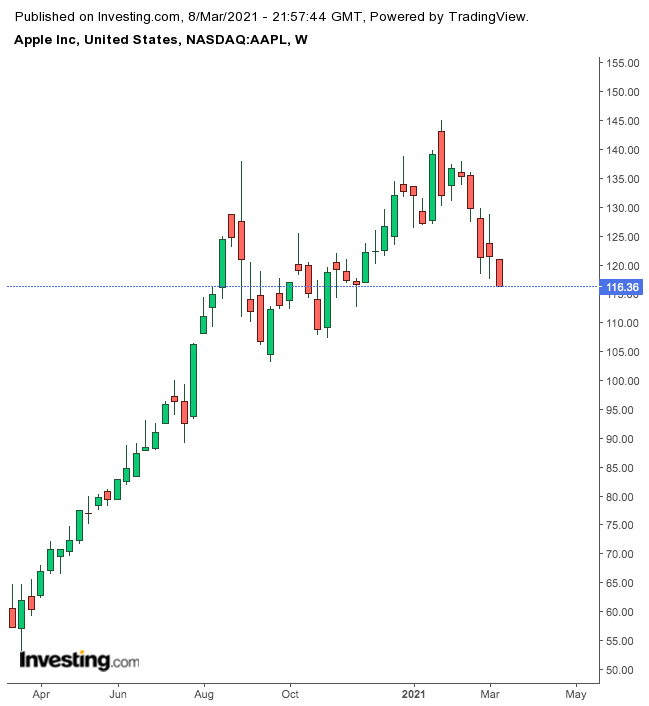If you have cash and are sitting on the sidelines waiting for the right time to pounce on some mega technology stocks, which one should be at the top of your buying list?
Among the world’s three largest tech stocks—Apple (NASDAQ:), Amazon (NASDAQ:) and Microsoft (NASDAQ:)— our favorite pick is Apple. The iPhone-maker has seen its shares plunge more than 15% from their January peak as investors, fearing higher interest rates down the line, sell high-growth stocks.

Apple Weekly Chart.
How long this sell-off continues is anybody’s guess, but there is a strong case for believing that Apple shares will rebound after going through this correction. Here are the three main reasons for our bullish view.
1. Retail Interest
One big indicator that tells us about the resilience of this bull market run is the participation of retail investors in stock investing. A year out from the COVID-19 stock crash, individual traders are now making up nearly a quarter of U.S. equity trade volume on any given day.
Since the market peaked a few weeks ago, retail traders have plowed cash into U.S. stocks at a rate 40% higher than they did in 2020, which was also a record year, according to a Bloomberg report. For such investors, the report says, Apple was the most-popular buy this past week.
With the U.S. government soon sending out checks from its latest $1.9-trillion stimulus package, more money will find its way into stock investing. And for retail investors, Apple continues to be one of the prime targets as its brand resonate with them.
2. Robust Capital Return
For long-term investors, whose objective is to earn a decent return through dividends and capital appreciation, Apple stock is a great choice.
With $196 billion in , Apple is in an enviable position to further increase its share repurchase program in order to support its shares. With share buybacks, the value of your Apple holdings will improve, as there will be fewer shares outstanding and a higher proportion of earnings being distributed among a smaller number of shareholders.
Warren Buffett, whose investment firm is one of the largest shareholders of Apple, has immensely benefited from this trend. Buffett has built a $120-billion stake in Apple since his Berkshire Hathaway (NYSE:) started buying the stock in late 2016.
Berkshire accelerated its Apple purchases through 2018, and has since been reducing that stake, allowing Berkshire to pocket $11 billion on the sales in 2020. Despite these sales, Berkshire’s stake in the iPhone-maker grew just because Apple also expanded its own repurchases, which shrank the number of its outstanding shares.
As Buffett told investors in his 2020 letter last month:
“Despite that sale – voila! – Berkshire now owns 5.4% of Apple. That increase was costless to us, coming about because Apple has continuously repurchased its shares.”
3. New Super Growth Cycle
After experiencing a sluggish growth period for its flagship iPhones, Apple is on the verge of another super growth cycle, fuelled by its newer 5G-enabled phone models.
The arrival of the iPhone 12, in our view, will trigger a record boom in sales similar to when the first large-screen iPhone was introduced in 2014, as millions of existing users will likely upgrade aging handsets.
The latest iPhone has the capability of accessing the next-generation cellular network, dubbed 5G, which promises faster internet speeds. In the last quarter, the new iPhone helped sales rise 57% in China, which has a more developed 5G network.
Apple isn’t just about iPhones, though. Apple’s services division, which includes the App Store, iTunes, Apple Music and iCloud, is showing strong growth, helping to diversify the company’s revenue base away from gadgets.
Last year, revenue from this division surged to $54 billion, more than double the amount it generated in 2016. If the pace of this growth continues, revenue from its services business could exceed $100 billion by 2024, according to Evercore ISI analyst Amit Daryanani.
Bottom Line
Buying Apple stock during this bearish spell is a good strategy, especially for those investors who want to hold the stock over the long run. Apple’s robust share buyback plan, the resurgence in its iPhone sales and its expanding services business are among the factors that will help its stock rebound quickly once this bearish spell is over.



